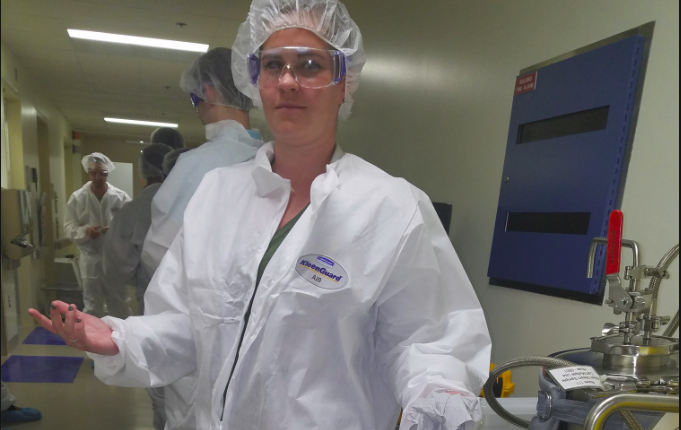
by Madison McHugh | Dec 5, 2018 | Graduate Students, Internship Experiences
My name is Amy Marks, and I am pursing a dual degree in the MBA/MA program with a specialization in Supply Chain Management. I was a Data Scientist Intern at Pfizer primarily responsible for improving the Supply Chain of pharmaceuticals through predictive analytics and machine learning algorithm improvement. During my time with Pfizer, I worked on a specific project in text mining through Latent Dirichlet Allocation and Natural Language Processing – in other words, I built models based on data in text format rather than numeric. In addition, I was responsible for building an interactive dashboard so that departments could interact with my findings independently based on their needs. My work allowed my team to quickly identify trends, patterns and areas in need of improvement and then communicate the results to the respective departments.
My internship directly supported my goal of improving access to medicine and vaccines in developing countries. Among its many global initiatives, Pfizer has a pledge to the Developing World under the Advance Market Commitment. Under the Gavi Vaccine Alliance, Pfizer has pledged to supply up to 740 million vaccinations to infants and young children in Gavi-eligible countries through 2025. This is only possible through sound supply chains, which are improved through data analytics.
My coursework equipped me with the basic skills and knowledge, but application in the real-life professional world can be challenging. Pfizer is an extremely fast paced, forward-thinking company; to keep up with everything going on around me was a big difficulty. However, I met the challenge by completing diligent research on topics before meetings, learning the big picture of specific projects, and, most importantly, identifying and improving on my personal strengths that could propel the company forward.
The most rewarding part of my internship was gaining exposure to a variety of business operations. I had the opportunity to tour research, manufacturing and quality assurance labs throughout the company’s various locations. I attended weekly learning sessions that provided information on the ongoing projects outside my field of study. I also attended multiple events that provided a variety of networking opportunities, including volunteering at a local park, meeting after-hours for team bonding, and attending various workshops. Furthermore, I was included on daily conference calls and meetings, which were extremely beneficial in experiencing how global operations are managed in a business setting.
My biggest takeaway from this experience was the importance of getting involved, taking initiative, and identifying the strengths that you can offer. It is much easier to remain in your comfort zone or to quickly be overwhelmed by the jobs’ expectations, or by all of the activity going on around you. However, every person working on a project contributes in one way or another, and it is imperative to be self-aware of what you have to offer, what you can learn and how you can apply it. This allows you to not only gain skills, but to increase your own confidence, network with professionals, and highlight your value as a potential future employee.
I recommend this internship for students interested in business as well as the unique position of pharmaceuticals to improve the world through the direct production and development of sustainable medicines and vaccinations. It was a truly unique experience.
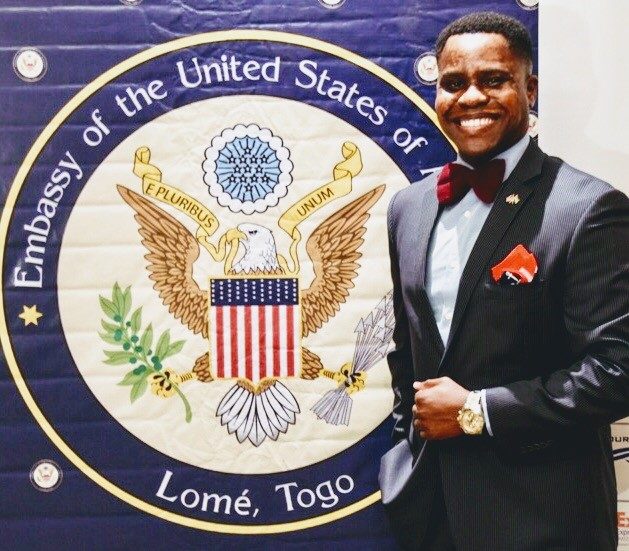
by Madison McHugh | Sep 12, 2018 | Graduate Students, Internship Experiences
My name is Erick Agbleke. While in pursuit of my graduate studies in International Relations and Diplomacy, along with specializations in International Security and Global Negotiation and Conflict Management, I was given the opportunity to intern with the State Department at a US Embassy of my choice. Since I was born in Togo, West Africa, I opted to spend 10 weeks at the Lomé Embassy with the Political and Economic (Pol-Econ) section of the mission. I wanted to return to my country of birth after spending 16 years abroad, to witness and study what kind of effects that U.S. international policies would have on a political climate I am familiar with.
A highlight of my internship with the State Department was a project assigned to me by the Chief of Section (CoS) to strengthen my security background. I wrote and recommended a strategy outline to combat wildlife trafficking in Togo based on the Eliminate Neutralize and Disrupt (END) Wildlife Trafficking Act of 2016. My recommendations, if approved by the State Department’s Office of Economic Growth, Energy and Environment, would be implemented as a policy and included in an annual congressional report. I relied on past project management skills that I developed through my professional career as well as my data collection skills to complete the necessary analysis.
Located south of Burkina Faso and east of Benin, Togo has become a transit state for ivory traffickers smuggling illegal goods. The traffickers take advantage of the porous borders and enter Togo with ivory in its raw form and make their way to Lomé to transform the ivory into art relics transported and sold elsewhere. Lomé is a strategic city for the smugglers because it gives them multitude avenues of exit. It is equipped with an international airport and a seaport serving as the maritime hub for the region, and smugglers utilize these avenues of travel to take ivory into south-east Asia. After my initial analysis of the wildlife trafficking framework in Togo, I was able to address the shortfalls and recommend improvements on how to the government could benefit from a partnership with the U.S.
Interning with the State Department has intensified my desire to become a diplomat and work with other countries to overcome the same challenges we share across the world. In my coursework, I learn and process instances where all areas of international relations are intertwined, amplified by my hands-on experience abroad. I have gained a deeper understanding on how security, diplomacy, conflict resolution and economic development must reconcile with one another to advance towards a common solution. In reflecting on the experience, I would recommend this internship to my fellow colleagues, as it is a great way to gain insight into the wonderful work we do abroad as a country. It is also a great opportunity to apply and test the plethora of theories we learn and discuss in the classroom with our professors.
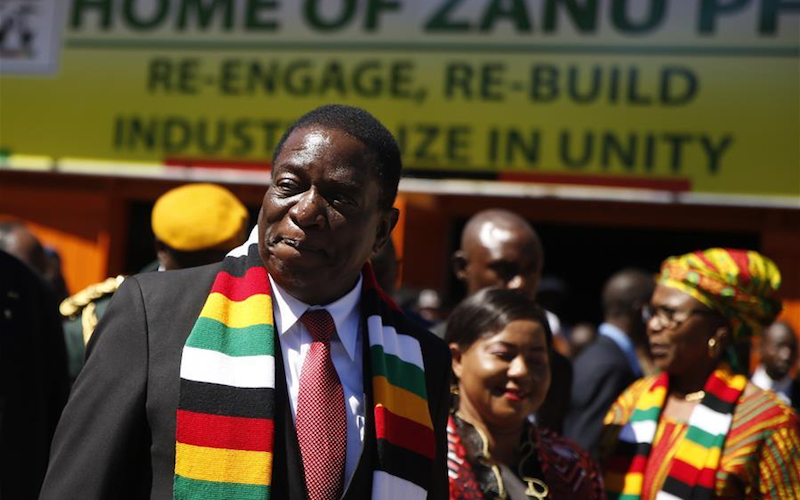
by Madison McHugh | May 9, 2018 | Graduate Students
M.A. first-year Diplomacy student Erick Agbleke originally published an op-ed piece on “China’s Neocolonialism in Africa” in the Journal of Diplomacy. The piece was then chosen for publication in the International Policy Digest.
Below is a re-print of the article, also located at the link above.
Behind the Goodwill Aid: China’s Neo-Colonialism in Africa
Erick Agbleke
December 2018 will mark the 3rd anniversary of the 6th Ministerial Conference of the Johannesburg Summit of the Forum on China-Africa Cooperation (FOCAC), where China’s Xi Jinping pledged to strengthen an already steady relationship with the African continent. With a promising speech to the African Union leadership and Heads of State, Xi promised to deliver a $60 billion package over the next 3 years that will include aid, interest-free loans, and capital.
To the 53 African countries that were in attendance, this was a welcome gift as Africa was just coming out of the ebola outbreak which left devastating effects in its path. It seems that China has found a way to expand its sphere of influence in the globalization race of the 21st century. Moreover, it is on the way to surpass the United States in terms of relevance and impact within the area. So, how and why does this matter, given the United States’ interest in the African region?
It is no secret that foreign aid can be used as a bargaining chip, where it goes a long way in facilitating international relations. For instance, the Marshall Plan of post-World War II was not initiated just out of the good heart of the US government. It was rather erected as a roadblock to the spread of communism in Western Europe. In the same way, China’s willingness to pour money and resources into the continent of Africa is not motivated by some form of sincerity towards the people, but rather to further its own agenda.
This financial sponsorship has ironically gained popularity with African leaders who welcome with open arms the gifts that Zhongnanhai come bearing to them. This allows China to bring businesses to the continent and build much-needed infrastructure, such as railroad tracks for transportation and commerce while instituting their ‘one belt one road’ initiative. However, this form of investment turns out not to be mutually beneficial to the African people. It buries the continent in insurmountable debt that the Chinese government maintains as leverage, a boon for them in terms of strategy. Case in point, the establishment of the first Chinese Naval base in Djibouti, which enables them to gain quick access into the Indian and Atlantic Ocean.
The West has a history of turning a blind eye towards Africa and its citizens, and Africans have come to accept such western indifference. Despite many clearly botched and stolen elections, including evidence of human right violations and overt dismissal of the rule of law, western powers have refused to hold many leaders accountable for their actions, no matter how vile they may be.
The silence from these countries who are typically quick to speak up and take actions when their interests are being threatened has emboldened some of these African leaders and empowered them to continue governing as they see fit. In the end, the collateral damage becomes the people they have sworn to lead and protect. China striving to be the biggest supporter and financier on the continent should be something that we should be concerned about; given the fact that they themselves are a substantial perpetrator of human rights violation and governmental intimidation. China’s waxing power on the continent may lead to an even greater disregard of human rights violations.
For the United States to regain a strong foothold within Africa and further advance its agenda of peace, power, prosperity, and principle, it must be willing to be the biggest stakeholder in terms of aid and financial support of the continent by investing in its growth and development. However, monetary support is not the only path to winning hearts and minds. Up until the Trump administration was handed control of the government, the U.S. was the best destination for education and business ventures. To some, the American Dream was still alive and attainable if they worked hard and played by the rules. This is no longer the case as the current administration sees fit to walk a hard line against immigration.
Programs such as the Temporary Protected Status (TPS) or the Deferred Enforced Departure (DED), which gave a way for multitudes of individuals that fled the atrocities in their civil war-torn countries to find refuge in America are being terminated. Families that have spent most of the past two or three decades building a new life here are being urged by a deadline to return to a country that is no longer theirs.
These more dismissive and closed policies can lead to a drop in foreign influence for a country such as the U.S., whose popularity has been on the decline over the last ten years due to the conflicts in the Middle East and elsewhere in the world. The policies being pushed by the Trump administration could, in turn, make it hard for the U.S. to gain support on the African continent while trying to curb the rise and effectiveness of terrorist groups that are operating in the area and threatening its interests.
The U.S. which has always championed itself as the vanguard for human rights around the world owes it to itself and for the success of its foreign policy to stand up to China’s expansion strategy. It will help tremendously in deterring terrorism and radicalization in Africa. However, the work should not solely rest on the Americans’ shoulders. The leadership in African countries must first recognize the neo-colonial practices that China is indirectly imposing on them and then stand against such unfair practice. To break free from dependency on outside actors and grow, there must be a willingness among the consortium to take responsibility for the development of the African continent which should be done in-house.
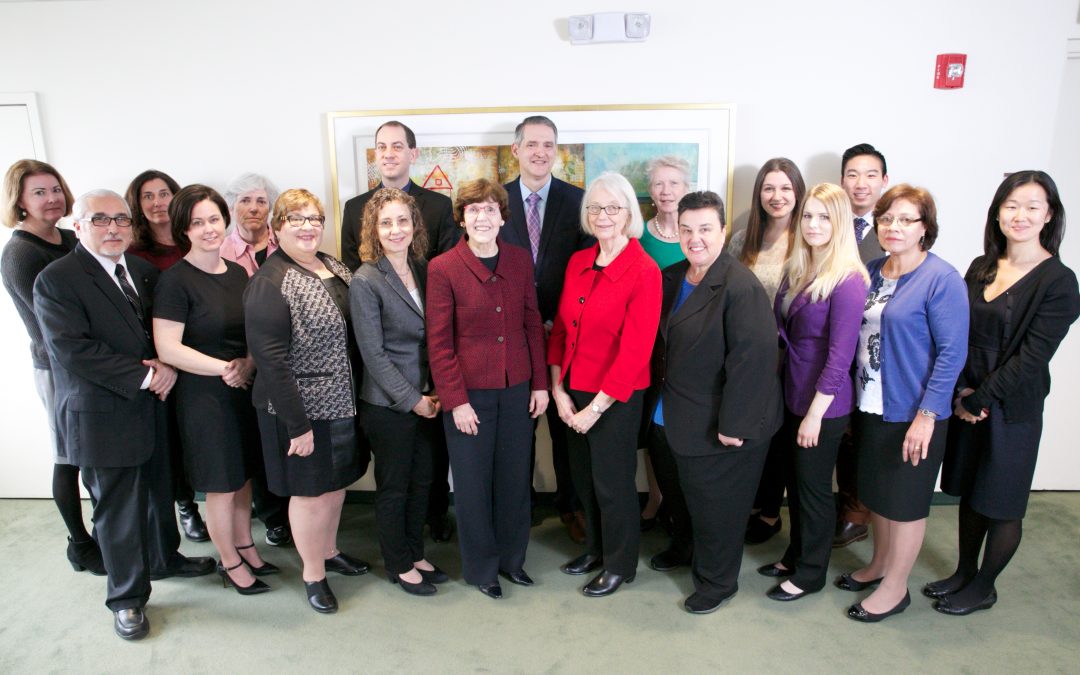
by Madison McHugh | Apr 19, 2018 | Graduate Students, Internship Experiences
My name is Madison McHugh, and I am a graduate student in the dual degree program at Seton Hall University. I am obtaining a Master of Business Administration as well as a Master of Arts in Diplomacy & International Relations. I interned as the Communications Associate at The Nicholson Foundation, a non-profit organization in Newark, NJ focused on funding projects in health and early childhood across the state.
As a Communications Associate, I worked directly under the Communications Manager and assisted in assignments related to the official branding of all materials for The Nicholson Foundation. These assignments included managing website content, posting for the organization’s official social media, and writing and editing press releases, op-eds, and speeches.
My coursework in the dual MBA/MADIR program prepared me for success in my internship as I utilized skills such as research, writing, and public speaking. Not only do I feel that I honed my writing into specialized capacities, such as those embodied in health and early childhood education, but I am confident that I can fulfill the responsibilities of a communications position in my post-grad prospects.
My internship with The Nicholson Foundation was a unique experience because it offered me vast flexibility in assignments and responsibilities. Moreover, my individual input was highly valued within the organization, and many of my ideas were implemented during my time. I was even able to pitch a unique idea to the Executive Director: I wanted to create and manage his official, professional Twitter page. To this end, I created a PowerPoint and pitched the idea after setting a personal meeting. He was very receptive, and with more discussion on details and management in the weeks to follow, he agreed that I should move forward with my idea.
The freedom that I was given at The Nicholson Foundation was both exhilarating and intimidating. On the one hand, I was able to capitalize many times on my ideas and implement positive changes towards increased efficiency and impact within and without the organization. On the other hand, the Communications Manager offered me a great amount of responsibility during his paternal leave, and I managed the Communications Department in his stead throughout April and May. At the time, while I had been acclimated to the chain of command, it was a new and exciting challenge to manage to both positions as well as the needs of the department as they overlapped with others in the organization.
I would highly recommend this internship to students who want the opportunity to put their innovation, originality, and professional drive to the test. The Nicholson Foundation is a wonderful organization that embraces new ideas and values contributions from youth that perpetuate the organization’s legacy as a health and early childhood funder in New Jersey.
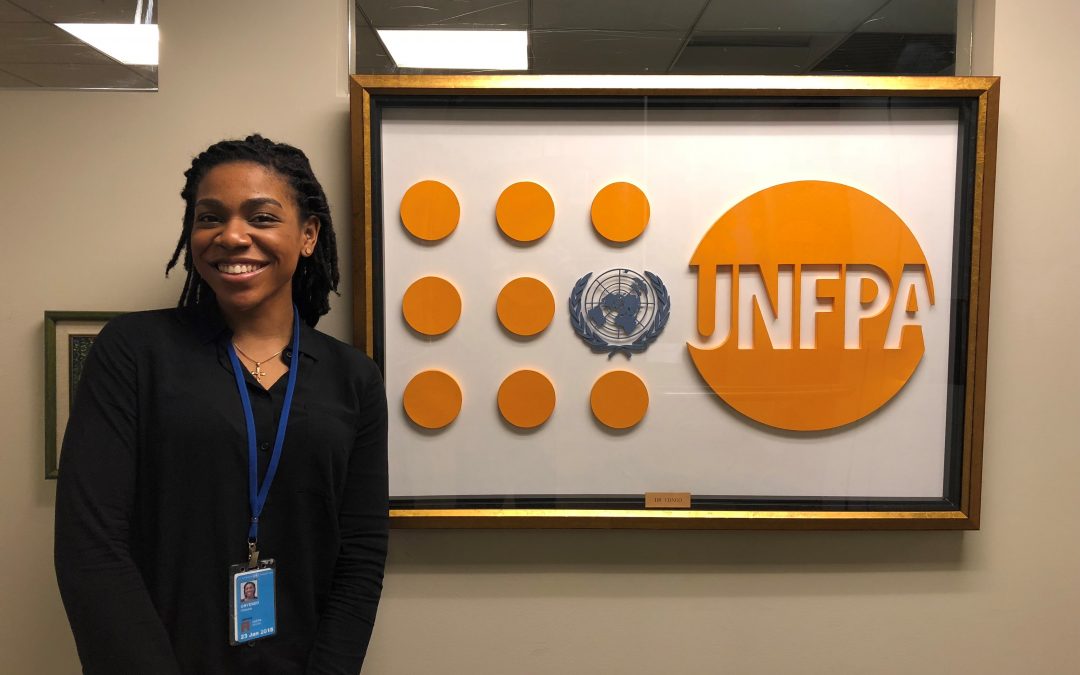
by Madison McHugh | Feb 7, 2018 | Graduate Students, Internship Experiences
My name is Chiazam Onyenso, and in my final semester within the Master of Arts program in International Relations and Diplomacy, multiple experiences have driven my current desire to continue my academic pursuits as they pertain to international affairs. My interest in collaborative international agencies reflects the internship I’ve committed myself to at the United Nations Population Fund.
My first-year M.A. studies mainly observed the nature of conflict, theories on the correspondence of the international community, resolutions and the management of international institutions that all catalyzed my eagerness to work for the United Nations. As a humanitarian information management intern for its Humanitarian and Fragile Contexts Branch (HFCB), working with the United Nations Population Fund (UNFPA) provided me with relevant knowledge on the effects of crises and the various avenues utilized by UN agencies to provide relief to affected populations and to address critical international issues. I developed exceptional skills in internal correspondence, analyzing and visualizing data, and reporting on fast-paced crisis situations in real-time. My assignments required background knowledge on humanitarian crises along with nurturing a strong understanding of UNFPA’s gender-based violence and health services for youth and women in conflict.
My experience as a UNFPA intern made me increasingly interested in staying with agency, in order to continue learning more on how it functions to fulfill its mandate and begin my career. Since last July, I have assisted HFCB in creating fact sheets, developing situation reports and analyzing information that will gradually populate UNFPA’s newly launched data portal, and the upcoming Humanitarian Action Overview for 2018. At the UNFPA, my work has been greatly complemented by the skills and knowledge I’ve procured through my master studies. Specializing in International Organizations, Global Negotiation and Conflict Management, while also earning a certificate in Post-Conflict Reconstruction and Sustainability has contributed to my understanding of UNFPA’s role and overall humanitarian response. Most of all, I’ve recognized the most crucial capacities of international assistance and aid rely on sound international law.
I hope to broaden my experience in international relations in line with international law. Adequate response to affected populations and vulnerable groups across the globe depends on human rights policy and effective rule of law; essentials that have been made incredibly clear to me at UNFPA.
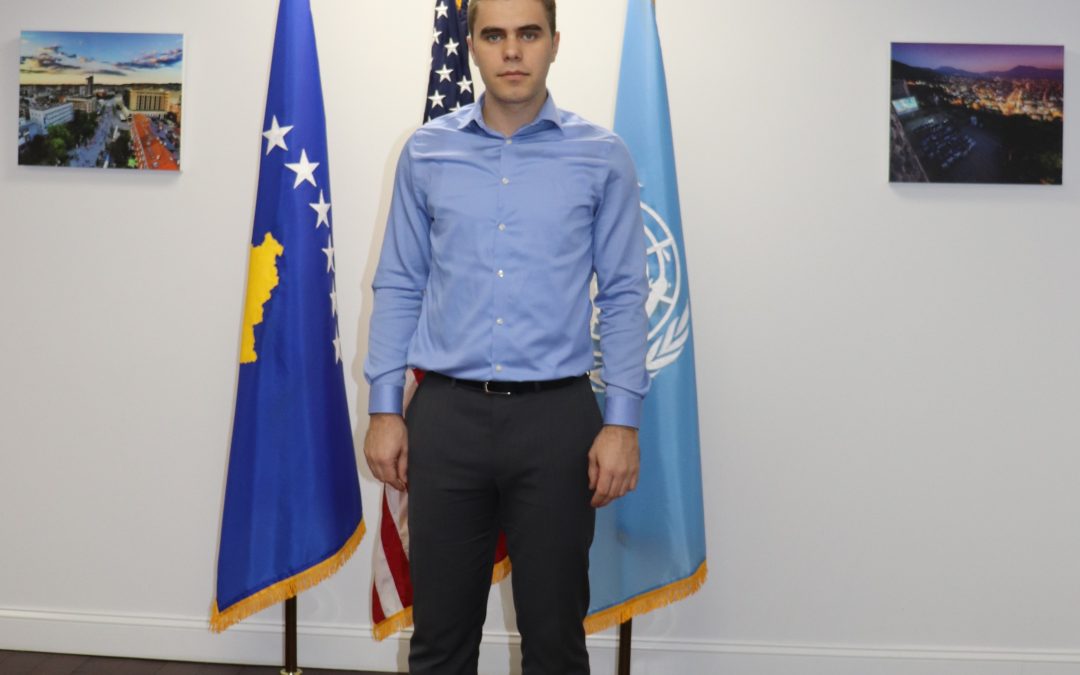
by Madison McHugh | Jan 24, 2018 | Graduate Students, Internship Experiences
My name is Lis Kabashi, and I am studying International Relations and Diplomacy at Seton Hall University. I come from a city called Mitrovica, which is located in the northern part of Kosovo.
I interned at the Consulate General of the Republic of Kosovo. In contrast to other Consulates, the Consulate General of Kosovo serves a dual purpose. Apart from serving its citizens in the US, the Consulate General also serves as a lobbying ‘mission’ to the UN, seeking more recognition for the Republic of Kosovo.
I decided to intern at the Consulate General of the Republic of Kosovo because in the future I would love to work as a diplomat for my country in one of our Embassies around the world. As the number of countries that recognizes Kosovo has gone up to 114, new Embassies and Consulates are opening up around the world. Thus, demand for experts in international relations and diplomacy has increased. For me, the experience at the Consulate General is a very important first step towards that goal.
My intern duties at the Consulate varied. For example, I prepared news analyses and reports on current events related to the Republic of Kosovo. Such analyses and reports served the purpose of informing the Ministry of Foreign Affairs in Kosovo.
During the UN General Assembly 2017, the Consulate received two High-Level Delegations: Presidential and the Ministry of Foreign Affairs. Along with another intern, I led the efforts in putting together files for each meeting that took place. These files, intended for the Chief of Cabinet for each delegation, consisted of brief biographies and resumes of each High-Level leader. Since most of our classes at the School of Diplomacy require us to learn about foreign policy decision makers from countries all over the world, I think that this is one of many ways how my internship related to my classes at the School of Diplomacy.
The opportunity to work at the Consulate was not only a period in which I learned about diplomacy – it was instrumental in building my professional network. Over two months, I had the honor of meeting Ambassadors and diplomats from various countries and attending functions hosted by different missions at the UN. Almost all of the diplomats that I met shared some of their experience and knowledge with me. Thus, I have learned how to think as a diplomat as well as how leaders protect the interests of their countries.
I recommend the internship to those who are interested in having a career in diplomacy. Apart from meeting key decision makers from all over the world, an intern at a Consulate could also improve their written and verbal communication skills, which are key to becoming a successful diplomat.

by Madison McHugh | Nov 29, 2017 | Graduate Students, Internship Experiences
My name is Marissa Hutton, and I am currently a second year graduate student completing a dual degree in Diplomacy and International Relations and Strategic Communication. During the summer of 2017, I interned at an international communications firm, BLJ Worldwide in New York City. Daily responsibilities varied, but over the course of a week, I would typically produce memos on a variety of topics, create and manage databases of contacts and edit different pieces of writing.
The great thing about BLJ is that it was rare for interns to be tied down to a single project all day. The firm’s numerous clients meant that interns completed multiple tasks in a day and utilized different skill sets to assist the account managers. Even the smallest task of gathering contact information could become a springboard for an account manager to set up vital meetings for clients that could have long-term effects on their business. That was one of my favorite parts of being in the office: no job was too small and everyone appreciated the work done for them.
In terms of diplomacy, my internship required that I write, analyze, and conduct research on multiple current events each day. Our work tended to focus on diplomatic hot spots and areas that are sources of much discussion and analysis for a diplomacy student. Each day, interns ventured into Google News to pull any media mentions in order to create a report that illustrated the “public mood” in a 24-hour period. Due to international events at the time, some clients received an extensive amount of coverage, which then required me to conduct research on the media outlets and institutions discussing them, a process that exposed me to important influencers in the media and academia.
I also found that a large number of the case studies I was asked to analyze in my courses help me complete tasks in my internship. In my communications courses, these studies gave me a bank of examples to look back upon and draw new conclusions from, whereas in my diplomacy courses, the case studies provided me with important background information and policy analyses that I drew upon in writing memos for clients on diplomatic matters and institutions.
In terms of my career choice, this internship provided me with an answer to that ever-looming question: is this really what I want to do with my life? Thankfully, that answer was a resounding yes. My elders always said that if you are able to find enjoyment in all aspects of your career, then you never truly ‘work’ a day in your life. That is what I discovered about myself through my work at BLJ. I sincerely enjoyed everything from media monitoring to editing to the endless amounts of reading required to stay on top of the game. While my past internship experiences provided me with professional skills and knowledge, this one gave me much more: experiential confirmation that I made the right choice.
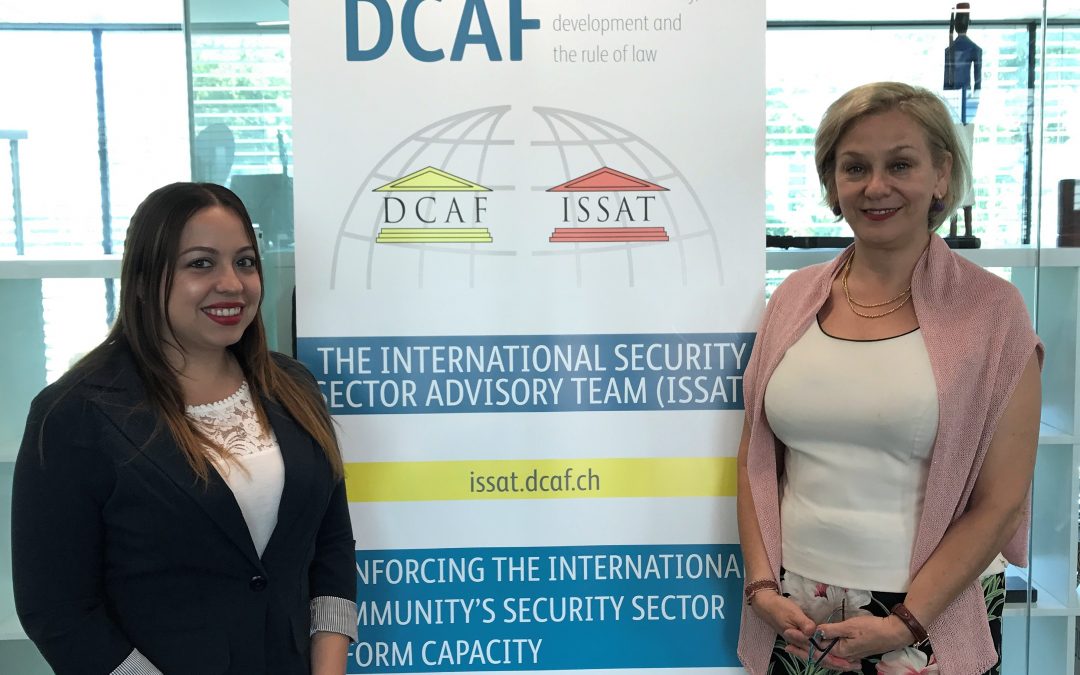
by Madison McHugh | Nov 1, 2017 | Graduate Students, Internship Experiences
My name is Marisela Rivera, and I am a Master of Arts candidate at Seton Hall`s School of Diplomacy and International Relations. Over the summer I had the pleasure of serving as the Sergio Vieira de Mello Fellow for the Geneva Centre for the Democratic Control of Armed Forces (DCAF) in Geneva, Switzerland, the international capital of the world. The fellowship honors a former United Nations Diplomat, Sergio Vieira de Mello, who was killed in the Canal Hotel bombing in Baghdad, Iraq in 2003. Mr. Vieira de Mello is remembered for his long and distinguished career with the UN as well as his efforts to promote peace, human rights and humanitarian aid.
Like Mr. Vieira de Mello, I am passionate about fulfilling peace and security for all. I specialized in two eminent concentrations to promote peace and security: International Law & Human Rights and International Security. My two specializations and my keen interest in Latin America have well prepared me for the fellowship. My host organization, DCAF, is an international foundation that is well-known for its support of security, development, and the rule of law.
Within the DCAF, I worked for the International Security Advisory Team (ISSAT). ISSAT was created to increase the capacity of the international community to support Security Sector Reform (SSR) processes, enhance the effectiveness and quality of SSR programming, and facilitate the coordination and coherence of international assistance for nationally-driven SSR processes. It focuses on four key services: advisory field support, training and capacity development, knowledge services, and advocacy and outreach.
Prior to my arrival, DCAF created a Latin America and Caribbean (LAC) department dedicated to Security Sector Reform. I worked with the director to set the foundation and sustainability flow for this particular department. Together, we created a strategy for LAC, as well as an overview of donors to the region. I utilized my social media and advertising skills to create a memorable LAC webpage, and I wrote country background notes, particularly in Latin American countries. In addition, I was tasked to develop a knowledge product for the Gender and Security section that applied a gender lens to explore the application of local ownership in SSR. The case study analyzed two countries and explore the lessons learned to increase the discussions on Women, Peace, and Security (WPS).
One of the most challenging and gratifying experiences was familiarizing myself with international security and human rights dialect in Spanish. Being of Colombian descent, Spanish is my first language. However, growing up in America and being part of the public education system, Spanish was not a priority. Through DCAF, I learned the importance of bilingualism and the various opportunities that it brings.
Overall, my time with DCAF was insightful and rewarding. I fulfilled many assignments in my area of study, and I was trusted with the duties of a Project Assistant as well as the work of an SSR Officer. My position at ISSAT offered first-hand experience in SSR, specifically in the international security aspect of my career. Given that this is the second year the Sergio Vieira de Mellow Fellowship was offered to a Seton Hall Graduate student, I would highly recommend my fellow peers to apply for this position in the future, and I know I will cherish the knowledge and experience gained with DCAF forever.








